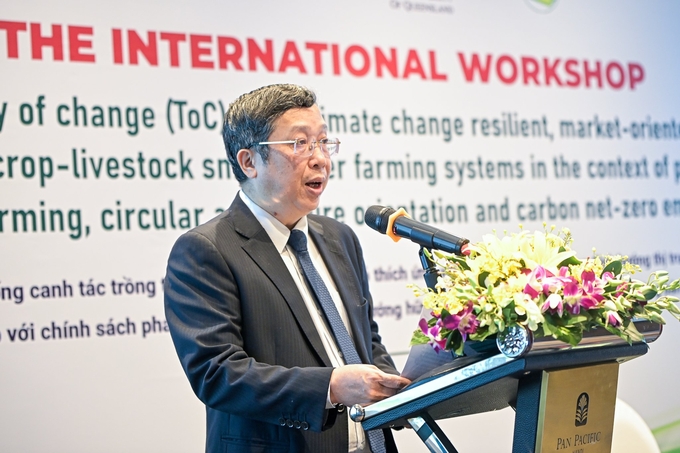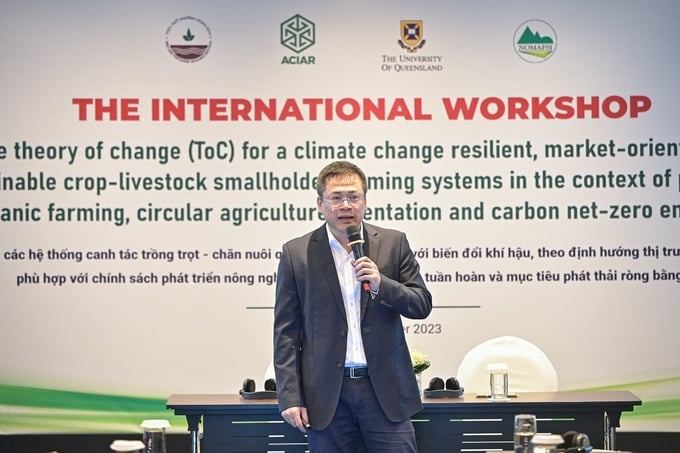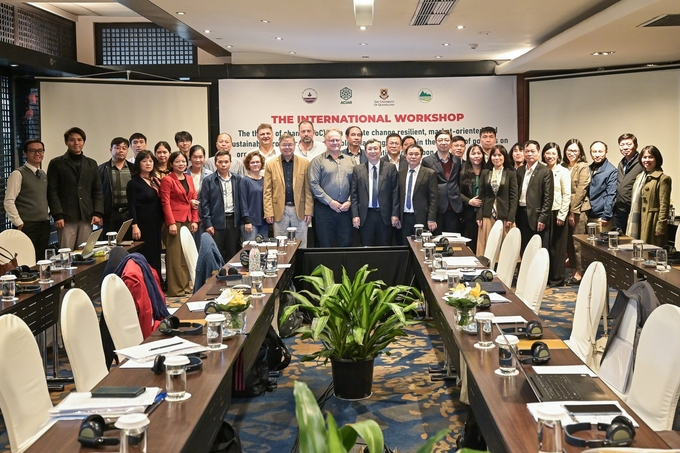May 30, 2025 | 05:46 GMT +7
May 30, 2025 | 05:46 GMT +7
Hotline: 0913.378.918
May 30, 2025 | 05:46 GMT +7
Hotline: 0913.378.918

Deputy Minister Hoang Trung called on relevant parties to pay more attention to the Northwest region. Photo: Tung Dinh.
Deputy Minister of Agriculture and Rural Development Hoang Trung said that climate change has greatly affected the global food production system in recent years. As the need for environmental protection and combating climate change becomes increasingly urgent, sustainable development, adaptation to climate change, low emissions, and circularity are the trends many countries choose.
At the national level, Vietnam has included the content "Proactively monitor and respond effectively to climate change; develop a green economy, reduce waste, mitigate greenhouse gas and low carbon emissions; Encourage the development of circular economic models for integrated and effective use of the output of the production process" into the Socio-Economic Development Strategy, period 2021-2030, vision 2050.
In particular, it is determined to promote agricultural restructuring, exploit and promote the advantages of tropical agriculture, and develop concentrated commodity agriculture in a market-oriented direction; Implement crop restructuring following market advantages and needs; Improve the resilience and adaptability of agriculture and farmers to climate change in each region and region.
In January 2022, the Government concretized this determination by issuing the Strategy for Sustainable Agricultural and Rural Development for 2021-2030, with a vision to 2050. The goal is to build circular, transparent, and responsible ecological agriculture, contributing to increasing the added value of Vietnamese agricultural products and ensuring sustainable development.

Associate Professor Dr. Tran Minh Tien, Director of the Institute of Soils and Agrochemicals, stated some solutions to improve Northwest soil through growing legumes. Photo: Tung Dinh.
The international workshop "Changing small-scale crop and livestock farming systems to adapt to climate change, market-oriented and sustainable following organic agricultural development policies, circularity and net zero emissions target" on the morning of December 5 is another step for related parties to "Think innovatively" and "Act together", according to Deputy Minister Hoang Trung.
One of the main contents of the conference is to share and discuss lessons learned in agricultural research and development in the Northwest region.
Although there is much potential, the development of the Northwest is currently uneven. Besides some provinces that have made many breakthroughs in agricultural development (such as Son La and Lao Cai), many Northwest provinces still have not effectively promoted their potential and advantages for agricultural development.
In addition, the models are deployed mainly on a narrow scale, so their effectiveness and pervasiveness are not high. Many areas in the Northwest arable land are seriously eroded, the land available for agricultural cultivation is relatively small and fragmented, mainly cultivated on sloping land, and farming methods are not sustainable and effective. Production is low, and many typical local agricultural products are not connected to the market.
At the conference, Professor Michael Bell, Queensland Alliance for Agriculture and Food Innovation (coordinating organizer), outlined some of Australia's experiences in increasing the sustainability of farming systems. Accordingly, greenhouse gas emissions from agricultural production currently account for about 14% of Australia's total emissions. This rate has remained stable for the past 20 years.
To achieve this result, Australian agriculture determined that emissions from agricultural production are mainly from methane emissions in livestock activities (about 77%). Another source is nitrogen oxides emitted from fertilizers and decomposed plant residues (about 19%).

Delegates at the conference. Photo: Tung Dinh.
Australia's solution is to strictly manage the health and fertility of livestock while giving livestock plenty of food from legumes (leucaena, alfalfa, vetch, acacia) and using dietary supplements.
Australia also had problems like Vietnam when small-scale livestock farming accounted for a large proportion. This hinders the animal's opportunity to supplement its diet. Therefore, the country's agricultural industry focuses on improving the forage quality by using more oleaginous crops or adding silage to high-yield areas.
Regarding emissions in farming, Mr. Bell pointed out that the habit of applying excess nitrogen causes excess nitrogen in the soil. In addition, nitrogen oxide emissions must be classified by industry groups, such as dairy, cotton, sugarcane, annual plants, seed trees, and old trees...
Proposing sustainable agricultural development and reducing emissions in the future, Professor Michael Bell believes that crop and livestock systems should be restructured to increase the cultivation of first-generation crops in rotational farming. Minimize tillage to slow carbon loss and intercrop perennial crops.
Sharing the same opinion as Professor Michael Bell, Associate Professor Dr. Tran Minh Tien, Director of the Institute of Soils and Agrochemistry, considers legumes a sustainable solution for the Northwest. This is evident in the ACIAR Project (SMCN/2014/049) on improving farming systems with maize on sloping land in the Northwest, implemented from 2018-2021.
The project is implemented at 4 locations in Son La province and 2 locations in Houaphan province (Laos). The main content is intercropping and intercropping of legumes in the maize farming system, intercropping of fodder crops and fruit trees in the maize farming system, and gradually converting maize to the maize farming system. Integrated cooperation includes fruit trees and fodder trees.
The project's sustainable corn farming model associated with livestock farming achieves steady increases in productivity each year. In Van Ho district, Son La province, Ghine grass productivity increased from 10.1 tons/ha/year (2019) to 14.1 tons (2021). Or in Yen Chau, it increased from 12.6 to 13.1 tons/ha/year.
Translated by Tuan Huy

(VAN) Ms. Nguyen Thi Dung, Deputy Director of Ngoc Hoang Cooperative, shared about the journey of bringing dragon fruit to Europe, achieving annual revenues in the billions of VND.

(VAN) Bamboo products from Thang Tho Bamboo Cooperative have reached many countries around the world, while also creating jobs for local workers.

(VAN) The Management Board of Con Dao National Park reported that a green sea turtle, tagged in the Philippines, has traveled thousands of kilometers to lay 84 eggs on Bay Canh Islet.

(VAN) Green technology is paving a new path for sustainable aquaculture in the Mekong Delta in particular and across the country in general, helping reduce emissions and adapt to climate change.

(VAN) On May 27, La French Tech Vietnam (the French startup and innovation community in Vietnam) held the French Tech Summit Vietnam 2025.
/2025/05/27/4731-2-223159_980.jpg)
(VAN) No votive paper, no styrofoam, no plastic bags, no plastic bottles, and no single-use plastic trays are the key rules tourists should keep in mind when visiting Con Dao.

(VAN) In the fight against plastic pollution, Vietnam has been demonstrating a proactive, pioneering, and active role in addressing the greatest environmental challenge today.